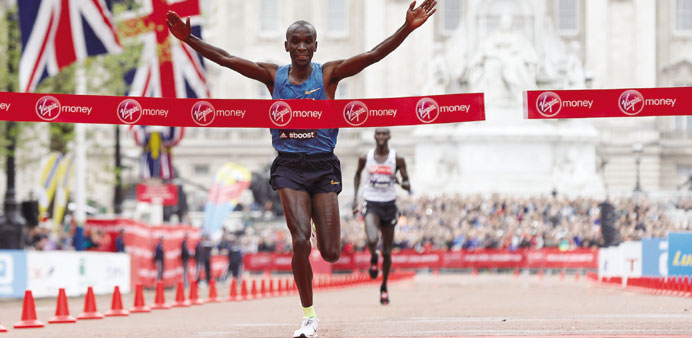Eliud Kipchoge of Kenya had won the London Marathon in April this year.
Reuters/Nairobi
London Marathon winner Eliud Kipchoge fears the reputation and earnings of Kenyan runners will be hit by fresh doping claims in the media, including allegations former Olympic medal winners had suspect blood readings.
Britain’s Sunday Times newspaper and German broadcaster ARD/WDR said they were given access to the results of more than 12,000 blood tests showing more than 800 athletes had given blood samples that were “highly suggestive” of doping or “abnormal”. Of the 800, reports suggest 77 were Kenyan athletes.
According to the Sunday Times, 18 of Kenya’s Olympic and world championships medals won from 2001-2012 were won by athletes with suspicious blood-test results.
ARD/WDR on Saturday aired documentary in which a hidden camera purportedly showed Kenyan athletes being injected with performance enhancing drugs. ARD also alleged corruption among Kenyan officials who wanted to cover up doping by the runners.
Kipchoge said the expose indicates there is some substance to the cheating allegations.
“That tells me that there is something fishy in Kenya,” he told Reuters.
“It will seriously affect Kenyan athletes endorsements in major races and marathons given that we have been banking on a good name abroad. It’s really bad.”
For some of the top Kenyan athletes sponsorship deals can be as lucrative as prize money, especially for long-distance runners who compete in only a handful of races every year.
Dozens of Kenyan athletes have failed drug tests over the past few years, casting a shadow over the success of Kenyan athletics.
Athletics Kenya (AK) has dismissed the latest reports as a smear campaign against the country’s famed middle and long-distance runners ahead of this month’s Beijing world championships, where Kenyan runners are favourites for many of the events.
“The unwarranted claims on the Kenyan athletes are deliberately aimed at derailing the preparations and the participation of the Kenyan team in the World Championships,” AK said in a statement on Sunday.
But Kipchoge questioned why the claims kept resurfacing if they were false.
“If doping doesn’t exist then why should people talk about (it)? There is something going on that we are not told,” said Kipchoge, a silver medallist at the 2008 Olympics.
Athletics chiefs in neighbouring Ethiopia said they were also following the latest media allegations.
“From our side, no athlete has come under suspicion. But the global athletics body is investigating the issue and will provide us with guidelines should the need arise,” Bililign Mekoya, General Secretary of the Ethiopian Athletics Federation, told Reuters.
“We are not taking any measures until then.”

